- Home
- Kristan Higgins
Always the Last to Know Page 5
Always the Last to Know Read online
Page 5
And while John would give me a card on Mother’s Day and make me a breakfast that used every pot and pan in the kitchen, and tell me to “take the day off from housework” (so I could do twice as much on Monday), he just didn’t see it. Or he pretended not to. When he “babysat” Juliet so I could do exciting things like grocery shopping all by my lonesome, I’d come home to find him reading with her parked in front of the TV, watching something other than the shows I allowed (half an hour a day on weekends, nothing on school days). He didn’t notice that the house was sparkling clean, even when she was a tiny baby, because the house had always been sparkling clean, and let me tell you, it wasn’t because he knew his way around a scrub brush.
He thought Juliet had just come out a certain way, as if she raised herself.
Sometimes, I had to grit my teeth when people told us what a great kid she was, and John would glow with pride. He’d say things like, “Well, my mom loves poetry, too,” forgetting that I read poetry to our daughter (and no one had ever read poetry to me, you can be sure about that). He sure didn’t read poetry—and he was related to Robert Frost, maybe! He rarely made it home in time to read anything at all to Juliet.
The truth was, John didn’t do a lot with our daughter except provide. And he was a good provider. I valued that. Of course I did, and I still tried to be a good wife, asking him how his day went, arranging our social life because he certainly didn’t. I’d invite the partners of his firm over for dinner and make sure everything was delicious and beautiful, and he’d say, “That was nice, hon,” and then try to put the moves on me, and ignore the fact that I had just made a dinner for twelve people and was darn tired. But I’d have sex with him, and when he was sound asleep, I’d go downstairs and clean up the mess from dinner.
His personal habits began to scrape my nerve endings raw. When we were new to Stoningham and I had nothing but the house and volunteering to occupy my time, it was absolutely fine if he left a towel on the bathroom floor or didn’t rinse out the sink after he shaved. I was a housewife, so I didn’t mind cleaning up after him, though it reminded me that when we both worked full-time, I still did ninety-five percent of the housework.
But now, raising our beautiful, wonderful daughter, that towel and sink told me he didn’t think anything had changed. That he was too important to put his own dang towel on the rack or in the laundry basket, that three seconds of sink rinsing was beneath him because he was a lawyer and I was just a mother.
Again, in hindsight, I probably should’ve said something about this.
His own mother appreciated me, because she’d been me. When his parents came to visit, John and his father would play golf, while Eleanor and I admired Juliet, because really, isn’t that what grandmothers do? She cooed and praised and held her granddaughter close. Once, when it was just the two of us, Juliet asleep in her arms, she said, “No one knows how much of your soul you give to your baby. They think it’s just luck or chance that your baby sleeps through the night, or doesn’t pitch a tantrum when you’re leaving a store, or knows to say thank you. They think you were tapped by a fairy wand, and they ignore all the hours you put in, shaping them.”
Gosh, it felt so good to be truly seen that way! Sad to say, Eleanor died when Sadie was three months old. I wondered if things would’ve been different if she’d lived. I bet she would’ve helped, and maybe recognized that I had postpartum depression, because she was a smart one, that Eleanor. She was always kind and wise. Much more so than my own mother, may she rest in peace.
But as it was, both John and I lost our mothers in the span of six months, and right smack in between those deaths, we had a newborn. Seemed like God was laughing at all those years of trying to have Juliet, and then, when Juliet was almost twelve, surprise!
John felt very heroic, taking care of Sadie, changing diapers and getting up in the middle of the night . . . something he’d almost never done with Juliet. He loved to tell me how much he did, as my breasts felt like they were being sliced by knives and turning hard as rocks. When my incision needed to be restitched because I’d had a coughing fit (don’t the doctors just love to tell you how you were responsible for everything that goes wrong?), John told me how he’d brilliantly arranged for Caro to pick up Juliet for Girl Scouts. Not only that, he’d taken a casserole I’d made the month before out of the freezer, so dinner was all set. I’d been saving that casserole for when he went back to work and was traveling, when I’d be alone with our baby and adolescent, when all household and child-related responsibilities would be on me and me alone. “It’s good, isn’t it?” he said at dinner that night. “Who made this?”
He was just so . . . obtuse sometimes. Most times, to be honest.
Just as Juliet and I had our own little world, he had one with Sadie. Juliet loved her little sister, but their time together was limited; she had homework and projects, activities and friends. The sides were pretty clear—Sadie and John, Juliet and me. I couldn’t help resenting his adoration of Sadie, because Juliet had gotten none of that. Sometimes I’d see her face as she watched her father giving horsey rides to Sadie, or drawing with her for an hour after supper, and I knew she was hurt.
When Juliet left for college, things got worse in our marriage. He was critical of how I interacted with Sadie, telling me I was too strict, that Sadie was a free spirit, that I had to be more flexible. If I said, “No more cookies, Sadie,” he’d inevitably sneak her one more. If I said it was bedtime, he’d give her fifteen minutes longer. He came home every night at six thirty and it seemed like all he did was pick at me regarding Sadie. Why was she in her room? So what if she’d told her teacher math was stupid and she wouldn’t do her assignments? Everyone hated math. Were we having pork chops again? Didn’t we just have them?
And he said these things in an amiable way, so if I were to say, “No, John, that was in April. I make a meal plan so we never have the same dinner twice in any month, and I’ve done that since the day we were married. Haven’t you noticed?” he’d say, “Okay, okay, I’m sorry. My mistake. I didn’t mean to offend you.” Then he’d wink at Sadie, or sigh if she wasn’t in the room, letting me know I was the bad guy here.
He always, always took her side. “She’s not Juliet. She’s her own person, Barb.”
“I know that! But she needs more boundaries and focus, John! I spend all day with her, and you breeze in for two hours of fun after all the hard things are done.”
“What’s so hard about your life, Barb?” Again, said in a condescending way.
You can see there was no winning these arguments.
By the time Sadie finally left for school, I was fifty-eight years old, tired and awfully relieved. And this time, John was the one who cried on the trip home. I’ve got to admit, it felt a little bit like justice.
I did hope that once we were alone, things would improve between us . . . hoped that my constant irritation with him would fade and we could become close again. But there was always a disconnect. If I put my hand on his leg in bed, he’d say, “Oh. I’m sorry, hon. I’m exhausted.” The next night, he’d be completely up for it if you get my meaning, and I’d be fighting to stay awake. If we did have sex, it was rare that we recaptured that old sunshiny feeling. Instead, it was just a box to be checked. Sex with husband. Done, thank heavens.
Men didn’t understand how hard it was to get in the mood. I hated movies when one kiss was enough for the woman and three seconds later they were doing it. Men thought that was normal. They took it personally if you weren’t like that, and please. I wasn’t twenty-five anymore. Men didn’t realize that we women had to talk ourselves into the mood a lot of the time, had to go through the motions until they were sincere, had to deal with the consequences of an aging reproductive system. Dryness. Hot flashes. Urinary tract infections. Less sensitivity. Cysts. All men had were penises that were or were not erect.
We started sleeping in different bedrooms during Sadie’s s
ophomore year of college, when his snoring took a turn for the louder and my bladder got me up two times a night. When we watched TV together, he’d sit in the recliner, and I’d sit on the couch, and ten minutes later, he’d be asleep.
John worked. I volunteered. Though he was Sadie’s favorite parent, I was the one who knew her college schedule. I was the one who made her retake her math requirement at the community college so she could graduate. I asked Genevieve London, who lived here in Stoningham and was quite a force in fashion, if Sadie could have an internship in the design department, hoping her art degree could somehow support her. (Sadie turned that internship down, FYI.)
And yet, I was always the mean parent, always the odd man out. I wondered what it was like to be loved by Sadie, to be respected, to have her come up and put her arm around my waist. Must’ve been real nice, I thought. If I put my hand on her hair or tried to give her a hug, she’d act all surprised and give me a look that said, What are you doing?
It was just so . . . draining.
To fill myself up, I turned to the place where I felt most like myself: Juliet. And her family, of course. But Juliet especially. There, with them, I was the best, truest version of myself. Happy, funny, helpful, listening intently as Juliet told me something about work or her friends, offering advice when asked. “That’s a great idea, Mom,” she’d say, or “I knew you’d have the perfect words.”
I volunteered, as I always had in Stoningham. I was on the school board, the historical society, the garden club, the Friends of the Library. There were hardly any year-rounders I didn’t know by name. Shopkeepers greeted me gladly; teachers would come to me with problems; newcomers to town were steered to me for guidance on how to fit into our tight-knit little community. I knew the pastor, the priest and the rabbi. I recommended volunteer groups—trash pickup, the food pantry, adopt-a-grandparent, the after-school program.
John knew I did these things, but they didn’t interest him. He played golf; he was on the fishing derby committee, which meant I wrote a check for $500 for the Scouts each spring, and John went and talked to the other dads.
And still I tried. It’s the woman’s job to steer the relationship, Caro told me (which didn’t prevent her divorce, mind you). So over dinner, I’d ask John about his day and get the customary answer . . . “Nothing exciting. Just the usual.” If I offered up what I did, his eyes would glaze over, and he’d say, “Hm?” in response. We took to reading instead of talking as we ate.
Holidays were generally wonderful, because of Juliet and the girls. I’d bake and decorate and play special music—all the things my childhood lacked out there in cold Minnesota. Juliet and her girls would help or admire, and Sadie would come home and sometimes even say something nice, like, “The house looks pretty, Mom” or “It smells so good in here.”
Times like these, I’d look at my husband and smile, thinking, Aren’t we so lucky? Two healthy children. Two healthy grandchildren. A lovely son-in-law. A beautiful home. Sometimes, I’d even say it. “Sure are,” he’d answer, and that would be it.
It was hard, feeling nothing but irritation toward him. Harder and harder with every passing year. When he retired at sixty-eight, my heart sank, because after all those years, he would be here, every day, day after day, getting in the way, pretending to try to be helpful but gumming it up enough so I’d shoo him away. He’d clean up the kitchen, which to him meant putting the dishes in the dishwasher and running tepid water into the pans. He wouldn’t wipe off the counters or empty the drain catch . . . The bits of food would just sit there until I took care of it. Inevitably, I couldn’t take the mess, so I’d start cleaning the pots and pans, and John would say, “Oh, I meant to do that! I’ll do it now.”
But of course, he didn’t. If he’d meant to do it, he would’ve done it. If he really and truly wanted to be helpful with the laundry, say, he wouldn’t have poured bleach right into the washing machine—on darks, no less—three times in a row.
“For a smart man, you sure can be dumb,” I said, trying to keep things light.
“It’s not a big deal,” he said. “There’s a learning curve.”
“And there’s three hundred dollars’ worth of clothes ruined because you didn’t read the instructions or listen to me.” The thrifty Norwegian in me was furious.
“I didn’t like that shirt, anyway.”
“Well, I liked mine a lot.”
“Barb. It’s not a big deal. Buy another one. You don’t have to get so upset all the time.”
“I’m not upset. I’m stating a fact.”
“I’m sorry,” he said in that condescending way that really meant, I’m sorry you’re being so petty, and I’m sorry I have to deal with this, and I’m sorry you don’t realize I’m the most wonderful thing in the known world.
I’m not sure when I started picturing widowhood as my happy alternative. John was healthy, but he was a man. He played golf. Weren’t there lightning strikes on golf courses? He drove down to the city to see Sadie, and you know how those New York drivers are.
It wasn’t that I wanted him to die. I just didn’t want to be married anymore.
“I think there’s something called divorce,” Caro said one blissful night when John had decided to stay over in the city (on the pullout couch in Sadie’s apartment, pretending to be twenty again, it seemed. We could afford a hotel room, after all).
I sighed. “We’ve been married for fifty years almost, don’t you know. Do people get divorced after that long?”
“Yes, but between now and your death—let’s say twenty-five more years—how do you want your life to be?” she said, taking a sip of her margarita. She had a point.
I thought for a moment. “Exactly the same, minus him.”
I’d already done some research. We were comfortable because of John’s work, but he never made partner. Too unambitious, too friendly to move up in the world. If we got a divorce, both of us would take a hit financially, which I told Caro. “I love this house and everything in it. I don’t want to have to move in with Juliet or live in some three-family house in New London and worry about paying my bills.” Caro had divorced long ago. But she had family money, and she’d gone back to school and become a public relations consultant and made a real good income. Real good.
She nodded slowly. “So . . . I guess we have to murder him.” She flashed her beautiful smile. “Or . . . or what? Is there any chance you can make things better? It’s not like he’s a horrible man.”
“No, he’s not horrible.”
“Trying to get along again would probably be better than murder or divorce.”
“Probably.” I smiled, but the thought made my shoulders sag. Another task for me to do. You could bet John’s friends weren’t telling him to be a more loving husband.
“As I tell my clients, fake it till you make it. You never know. If you pretend to be in love, maybe you’ll fall back in love again. So much of happiness is the habit of positivity.” Another sunny smile.
“I’m very glad to have you as my best friend, Caro,” I said, my voice a little husky.
“Oh, Barb! I’m glad to have you, too! I love you! And I love this margarita! Please tell me there’s more.”
We spent the rest of the night chatting, and she drank a bit too much and stayed over in the guest room, which she could do without a single phone call explaining her actions. She had two boys a little older than Juliet; one lived in Vermont, and the other in New York City, so just like that, we were having a sleepover. I couldn’t remember the last time I’d had so much fun with anyone except Juliet. Next to my daughter, Caro was my best friend. She lived around the corner and had brought over a cake the very first day we moved in. We clicked right away.
I took her advice, even though my heart wasn’t in it. I tried. I made a point of lining up things to do with John, or for the two of us and with other couples, like our newlywed days. Caro ha
d a steady beau named Ted (she refused to use the word boyfriend), and the four of us took ballroom dancing lessons, though John was clumsy as an ox on the dance floor. Karen, the dance instructor, would laugh till she cried sometimes, making us laugh, too. When Caro ruptured her Achilles tendon on a hike, we dropped out. There was a bowling league we tried, but I had some arthritis in my wrist, and it was painful. We went on a wine-tasting tour of Connecticut. Booked a trip to Italy with a group, which John summarized as “on the bus, off the bus; on the bus, off the bus” for the girls. Sadie lectured us about how shallow those bus tours were, and how we should’ve asked her for recommendations instead, since she was an expert on all things Europe (in her own mind, at least).
I’d thought our trip was quite nice. I liked the ease of the coach, not having to wonder where we’d stay each night, knowing a fairly decent hotel was part of the package. No, we didn’t explore and wander on our own, but we saw some beautiful churches and countryside. Why did John have to poke fun at it?
It was the same as always, somehow. If we had a good time, John always credited someone else. “That Caro is a spitfire” or “Ted has the funniest stories, doesn’t he?” or “Boy, that museum had some amazing pieces!” There was never a “thanks for looking that up and buying the tickets and getting me out of my chair when I was whiny about going in the first place.” He never called me a spitfire or complimented me on telling a good story, even though Caro and Ted laughed and laughed when I told them about my childhood war with that giant goat we’d had.
No, John just gave me a look. Her one fun story from childhood. Here we go again.
And in the entire time I was faking it, hoping to make it, John never reciprocated. He didn’t bring me flowers. He didn’t suggest we do something, go somewhere. He just showed up, sometimes after I had to pitch it to him, to win him over to the idea of seeing a darn movie.

 In Your Dreams
In Your Dreams Just One of the Guys
Just One of the Guys The Perfect Match
The Perfect Match Catch of the Day
Catch of the Day All I Ever Wanted
All I Ever Wanted Until There Was You
Until There Was You On Second Thought
On Second Thought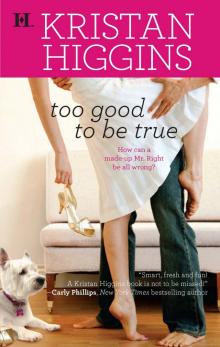 Too Good to Be True
Too Good to Be True My One and Only
My One and Only Fools Rush in
Fools Rush in The Next Best Thing
The Next Best Thing Somebody to Love
Somebody to Love Anything for You
Anything for You Waiting on You
Waiting on You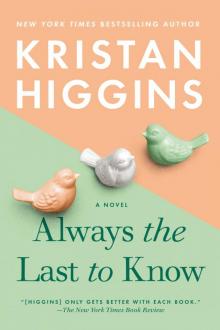 Always the Last to Know
Always the Last to Know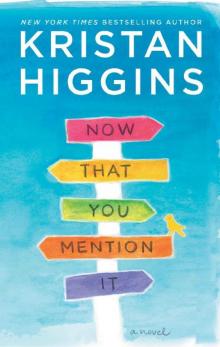 Now That You Mention It
Now That You Mention It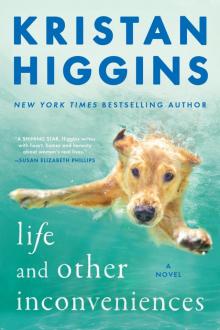 Life and Other Inconveniences
Life and Other Inconveniences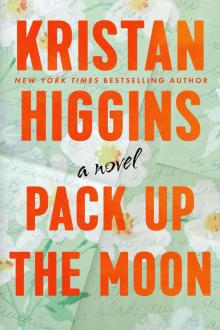 Pack Up the Moon
Pack Up the Moon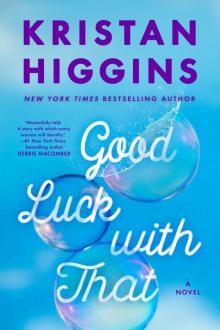 Good Luck with That
Good Luck with That![Blue Heron [2] The Perfect Match Read online](http://i1.bookreadfree.com/i/03/25/blue_heron_2_the_perfect_match_preview.jpg) Blue Heron [2] The Perfect Match
Blue Heron [2] The Perfect Match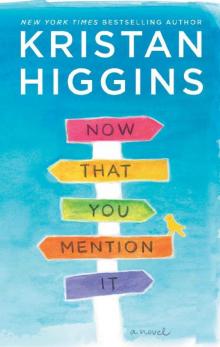 Now That You Mention It: A Novel
Now That You Mention It: A Novel